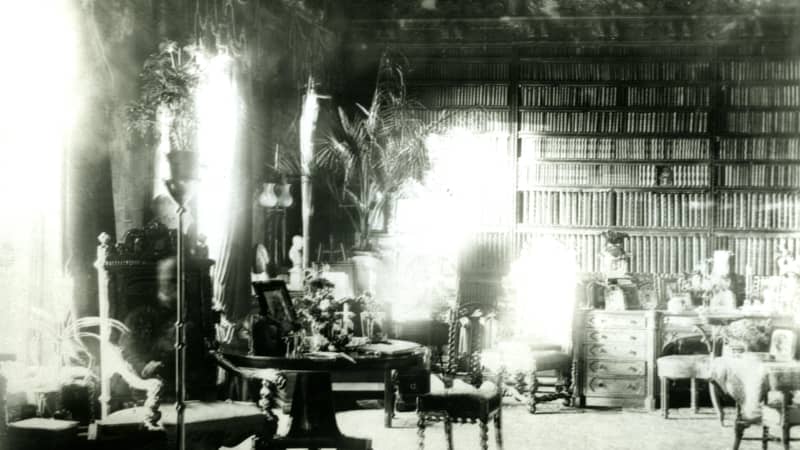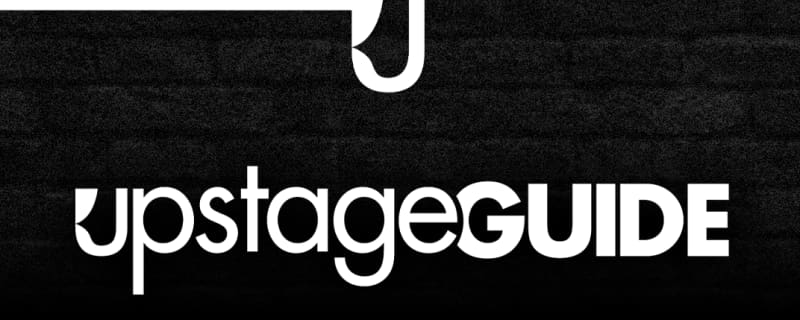I went to the crossroad, fell down on my knees
I went to the crossroad, fell down on my knees
Asked the Lord above, “Have mercy, now,
Save poor Bob, if you please”
– Robert Johnson, “Cross Road Blues”

This 1891 photograph is said to show the ghost of Corbet’s deceased brother-in-law, Lord Combermere, seated in the chair at left.
Photo by Sybell CorbetIn Covenant, the character of Johnny “Honeycomb” James is inspired, in part, by Robert Johnson, a blues singer, songwriter, and guitarist of legendary skill. His career was relatively short lived; Johnson died in 1938, aged 27, but the few recordings he left behind inspired generations of musicians. Furthermore, his legacy reaches beyond music history. Decades after his death, a myth about the origin of his extraordinary talent persists: he sold his soul to the devil at a rural Mississippi crossroad.
Several factors might explain why this tall tale took hold: for a long time details of Johnson’s life were vague or unknown; because the blues, in Johnson’s time, was considered by many to be the devil’s music, sinful and profane, with damnation certain for the musicians who played it; because some of Johnson’s own lyrics directly reference Hell and the devil; and because this sort of story—someone making a deal with the devil in exchange for astonishing gifts—has captivated the human imagination for centuries, across a vast variety of cultures.
Early this mornin’, when you knocked upon my door
Early this mornin’, when you knocked upon my door
And I said, “Hello, Satan, I believe it’s time to go”
– Robert Johnson, “Me and the Devil Blues”
In the lore of vodun (or voodoo), which originates from the West African nations of Benin, Ghana, and Togo, it was said that Papa Legba—a powerful spirit who was crowned chief of all gods through his musical skill—would bless musicians if they came to a deserted crossroads at midnight, imbuing their instruments with great power. In Europe, a Renaissance-era alchemist and magician named Johann Georg Faust became an iconic figure of literature and lore, thanks largely to two plays: Doctor Faustus, by Christopher Marlowe (first performed in 1592—for reference, the real Faust died in 1541), and Faust, by Johann Wolfgang von Goethe (published in 1808). In both plays, Faust, frustrated by his fruitless quest for scientific secrets, is visited by Mephistopheles, a demon servant of Lucifer, who offers infinite knowledge for Faust’s soul.
Variations on this tale—the “Faustian bargain”—endure to this day. In musical theatre, we have Damn Yankees (the devil’s deal, in this show, turns a middle-aged husband into a baseball star) as well as Little Shop of Horrors (with an intergalactic houseplant in place of a demon), The Little Mermaid (Ariel gives her voice to the sea-witch Ursula so she can walk on land), and Once On This Island (set in the Caribbean Antilles, a demon named Papa Ge convinces protagonist Ti Moune to give up her life so her lover may return to life). In the manga/anime Death Note, the death-god Ryuk offers teenage genius Light Yagami a murderous notebook—on the condition that Light’s soul will go neither to Heaven nor Hell when he dies. In all these versions of the story, the basic idea remains the same—great power comes with a price, and the price may not be worth the power in the end.
I got to keep movin’, I got to keep movin’,
Blues fallin’ down like hail, blues fallin’ down like hail
Blues fallin’ down like hail, blues fallin’ down like hail
And the days keep on worryin’ me
There’s a hell hound on my trail
– Robert Johnson, “Hell Hound on My Trail”
Only a handful of Robert Johnson’s songs deal with religious themes. Nonetheless, his evocative musical pictures of hellhounds, devils, and crossroads have bolstered the legend of his demonic deal. This imagery would have been on his mind from an early age. He grew up in a churchgoing family, with two relatives who were ministers, including an uncle who, in one sermon, drew upon a verse from Jeremiah 6:16: “Stand at the crossroads and look; ask for the ancient paths, ask where the good way is, and walk in it, and you will find rest for your souls.” Later in life, Johnson had a wife who died in childbirth; their child died as well. Johnson had been out on the road and when he returned, his wife’s friends and family blamed him, saying that she died because he had been gone playing the devil’s music.
Johnson clearly found hellfire and Satan to be compelling subjects for songs. But Johnson’s supernaturally-tinged lyrics can hold many meanings – some of which are speculated upon by Johnson’s sister, Annye C. Anderson, in her 2020 memoir, Brother Robert: Growing Up with Robert Johnson. For instance, Johnson sings about going to a crossroads in his song, “Cross Road Blues”—but the protagonist of that song is only trying to hitch a ride, growing increasingly panicked as the sun goes down. This is possibly a reference to “sundown towns”—communities in the segregated South that enforced violently racist curfews prohibiting Black people to be outside past sunset. On that topic, Anderson says, “When he tells you he doesn’t want sundown to catch him here, he knew exactly what had gone on.”
Anderson suggests Johnson’s song “Hell Hound on My Trail” may have been a reference to dogs used to catch runaway slaves: “[T]here’s a history on that hellhound. You’ll find many black people who talk about the hellhound. The connection is the white overseer.” And in “Me and the Devil Blues,” Johnson sings about “walking side by side” with the Devil – but this was already a well-established theme of the blues. As early as 1924, blues singer Clara Smith recorded a song called “Done Sold My Soul to the Devil,” and a blues guitarist named William Bunch—a contemporary of Johnson’s—went so far as to give himself the nickname “Peetie Wheatstraw, the Devil’s Son-in-Law.”
In writing his songs, Johnson drew inspiration from the culture around him, whether he was singing “Hell Hound on My Trail,” “Traveling Riverside Blues” (a lyrical catalogue of places Robert had visited along the Mississippi River), or “They’re Red Hot” (a musicalization of a local tamale-seller’s pitch). Perhaps the mystery of Robert Johnson continues to fascinate because the songs he left behind are so enigmatic—simple on the surface, but with a deep underbelly of allusions, symbols, and double meanings. His music does have an effect that might be called supernatural: in his songs, the America he experienced comes to life again.
Published on October 19, 2023.
References:
|
Anderson, Annye C. Brother Robert: Growing Up with Robert Johnson. Hachette Books, 2020. Burnett, John. “Voodoo and West Africa’s Spiritual Life.” NPR, 9 Feb. 2004. Conforth, Bruce M.; Wardlow, Gayle Dean. Up Jumped the Devil: The Real Life of Robert Johnson. Chicago Review Press, 2019. Johnson, Robert. King of the Delta Blues Singers. Columbia Records, 1961. Marvin, Thomas F. “Children of Legba: Musicians at the Crossroads in Ralph Ellison’s Invisible Man.” American Literature, vol. 68, no. 3, September 1996, pp. 587-608. Simon, Ed. “Speak of the Devil.” Lapham’s Quarterly, 8 Aug. 2022. |


